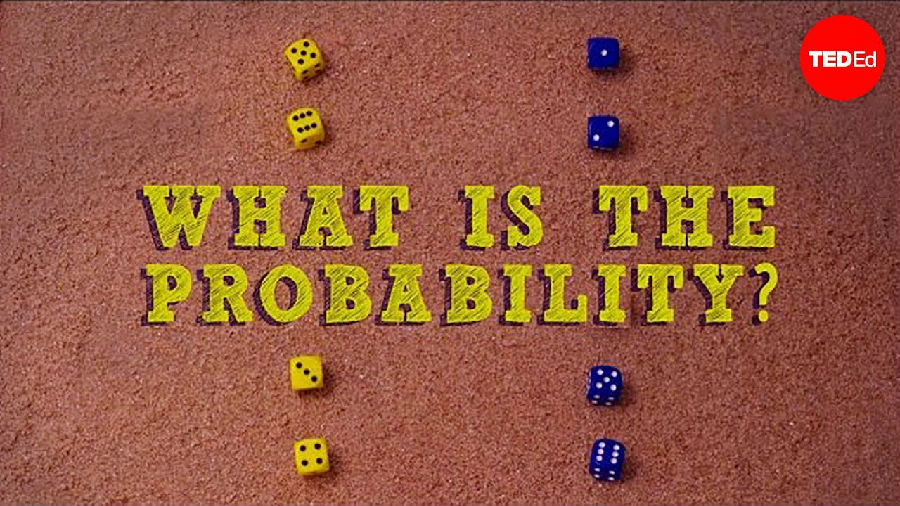(单词翻译:单击)
You and a fellow castaway are stranded on a desert island playing dice for the last banana.
你和另一个人一起被困在了一个被遗弃的小岛上,你们两人正在掷骰子决定最后的一个香蕉归谁。
You've agreed on these rules:
你们共同制定了以下规则:
You'll roll two dice, and if the biggest number is one, two, three or four, player one wins.
两人同时掷骰子,如果其中最大的数字是1,2,3或4,玩家1胜出。
If the biggest number is five or six, player two wins.
如果最大的数字是5或6,则玩家2胜出。
Let's try twice more. Here, player one wins, and here it's player two.
让我们看看两种情况。玩家1胜出。玩家2胜出。
So who do you want to be?
你会想成为哪个玩家?
At first glance, it may seem like player one has the advantage since she'll win if any one of four numbers is the highest,
乍一看来,玩家1占有优势,因为4个数字中只要有一个最大,她就能够胜出,
but actually, player two has an approximately 56% chance of winning each match.
但实际上,玩家2有56%的机会在每局中胜出。
One way to see that is to list all the possible combinations you could get by rolling two dice,
一种证明的方法是列出所有掷两个骰子可能得到的组合,
and then count up the ones that each player wins.
然后数出每位玩家胜出的局数。
These are the possibilities for the yellow die.
这些是黄色骰子可能掷出的所有结果。
These are the possibilities for the blue die.
而这些是蓝色骰子的。
Each cell in the chart shows a possible combination when you roll both dice.
在表格中每一格都表示一种可能的组合。
If you roll a four and then a five, we'll mark a player two victory in this cell.
如果你掷到了一个4和一个5,我们会在这个格子中标记玩家2胜出。

A three and a one gives player one a victory here.
如果掷到的是3和1,则在这里标记玩家1胜出。
There are 36 possible combinations, each with exactly the same chance of happening.
总共有36种可能的组合,每一种都有完全相同的机会发生。
Mathematicians call these equiprobable events.
数学上这样的情况被称为等概率事件。
Now we can see why the first glance was wrong.
现在我们就能够知道为什么我们的第一印象是错误的了。
Even though player one has four winning numbers, and player two only has two,
虽然玩家1拥有4个数字,而玩家2只有两个,
the chance of each number being the greatest is not the same.
但每个数字会成为最大的数的概率却不相等。
There is only a one in 36 chance that one will be the highest number.
1只有1/36的可能成为最大的数。
But there's an 11 in 36 chance that six will be the highest.
但6则有11/36的可能成为最大的数。
So if any of these combinations are rolled, player one will win.
在这些组合中,玩家1会胜出。
And if any of these combinations are rolled, player two will win.
而在其他组合中,玩家2会胜出。
Out of the 36 possible combinations, 16 give the victory to player one, and 20 give player two the win.
在36个组合中,玩家1胜出的情况有16种,而玩家2则有20种。
You could think about it this way, too.
你也可以这样思考。
The only way player one can win is if both dice show a one, two, three or four.
只有两个骰子都被掷出1,2,3,4的时候,玩家1才会赢。
A five or six would mean a win for player two.
因为掷出5或6的时候玩家2会赢。
The chance of one die showing one, two, three or four is four out of six.
一个骰子掷出1,2,3,4的可能性是4/6。
The result of each die roll is independent from the other.
每次掷骰的结果都是独立的。
And you can calculate the joint probability of independent events by multiplying their probabilities.
你可以将这些独立事件的概率乘起来算出联合概率。
So the chance of getting a one, two, three or four on both dice is 4/6 times 4/6, or 16/36.
两个骰子都掷出1,2,3,4的联合概率为4/6乘4/6等于16/36。
Because someone has to win, the chance of player two winning is 36/36 minus 16/36, or 20/36.
因为两方总有一方会胜出,玩家2胜出的概率则是36/36减去16/36,等于20/36。
Those are the exact same probabilities we got by making our table.
这些数值和我们刚才列表得到的结果一模一样。
But this doesn't mean that player two will win,
但是这并不代表玩家2一定会赢,
or even that if you played 36 games as player two, you'd win 20 of them.
或者说在36局中,玩家2不一定会胜出20局。
That's why events like dice rolling are called random.
这就是为什么像掷骰子这样的事件是被称为随机的。
Even though you can calculate the theoretical probability of each outcome,
即使你能够算出理论上每种结果的概率,
you might not get the expected results if you examine just a few events.
如果你只试了几次,你还是可能不会得到期望的结果。
But if you repeat those random events many, many, many times,
不过如果你尝试足够多的次数,
the frequency of a specific outcome, like a player two win, will approach its theoretical probability,
某种结果发生的频率,比如玩家2胜出,将会接近它的理论概率,
that value we got by writing down all the possibilities and counting up the ones for each outcome.
即我们刚才列表所得到的数值。
So, if you sat on that desert island playing dice forever,
所以,如果你一辈子坐在那个小岛上玩掷骰子,
player two would eventually win 56% of the games, and player one would win 44%.
玩家2最终将会有56%的胜出率,而玩家1则会有44%。
But by then, of course, the banana would be long gone.
但是等到那时候,那根香蕉肯定早就没了。


